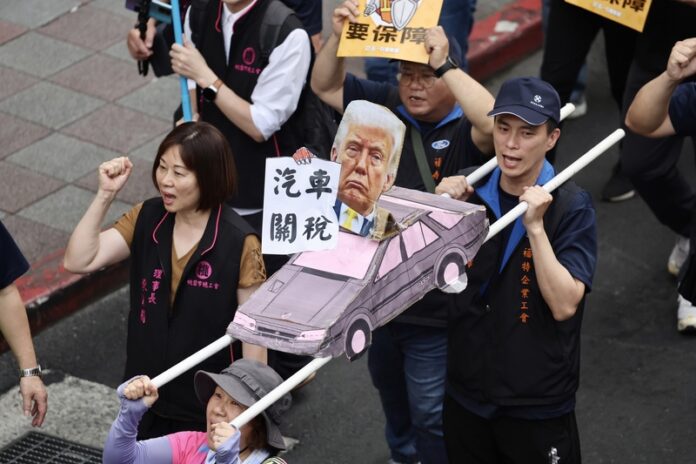Stand United with Taiwan’s Auto-Industry Workers
Workers Must Not Become the Casualties of Trade Negotiations!
International Socialist Forward
Against the backdrop of former U.S. president Donald Trump’s global “reciprocal tariff war,” the Taiwanese government is under mounting pressure to dismantle protective barriers in its domestic automobile market. Officials from Taiwan’s Ministry of Economic Affairs (MOEA) have publicly confirmed that import car tariffs are now on the agenda of US-Taiwan trade talks and that tariffs on US-built vehicles are expected to be reduced. Although the MOEA insists the cuts will apply only to cars imported from the United States, most observers anticipate a domino effect: other countries will demand the same treatment. This prospect has understandably stoked fear and anxiety among workers in Taiwan’s vehicle-assembly plants, who face incalculable risks to their jobs and future if trade protections are abandoned. Their worries are real — and justified. Since Taiwan joined the WTO in 2002, import duties on cars have been slashed from 60 percent to 30 percent, and again to 17.5 percent in 2010. Over these 22 years, the market share of domestically assembled cars has plummeted from 86 percent to 51 percent. Total unit sales have stagnated and are now slowly declining. Amid shifting consumer tastes and an ever-more developed used-car market, the outlook for local manufacturers is already gloomy. Should the government, under U.S. and domestic consumer pressure, scrap the remaining tariff wall, the decline of Taiwan’s indigenous car industry will likely accelerate.
Even the MOEA admits as much. In a public report last year it warned:
“…Lowering or abolishing tariffs could force domestic car and parts plants to shut down or relocate, jeopardizing production worth NT$84.774 billion and the livelihoods of some 82,600 workers.”
In other words, the ministry itself recognises that cutting tariffs would directly endanger more than eighty-thousand workers and their families — with wider repercussions that are impossible to quantify.
Auto-industry unions have begun to act. They demand that the government ceases back-room trade talks and allows unions to participate, so workers’ concerns are heard. At a recent press conference they insisted that “the government must let unions join the negotiations and create a mechanism that reflects workers’ core interests across all sectors; if the government refuses, we will take to the streets.”
International Socialist Forward fully supports these workers’ struggle and calls on all readers and allies to stand with them.
US-Taiwan trade negotiations must not be allowed to recklessly sacrifice jobs or incomes. Whatever the final deal, comprehensive measures must protect workers in affected industries.
Auto-assembly workers themselves must also recognise that only their own solidarity —and the sympathy of consumers and the broader working class— can secure real gains.
We understand the mainstream consumer frustration with Taiwan-made vehicles. Yet the uninspiring, sometimes even off-putting reputation of domestic cars is not the fault of the workers who build them. Responsibility lies with managers and owners of the industry, and with past government officials and policymakers. It would be outrageous if the benefits of two decades of tariff protection and state support had flowed to inept capitalists and rent-seeking bureaucrats—only for workers now to pay the price in layoffs when those protections are removed.
Workers must not bear the cost of their employers’ failures. Their fight is our fight. Let us stand together in solidarity.
Please send your solidarity to Taiwan workers to the following email address
taiwanlabortariffaction@gmail.com
See below a model protest letter that you may use to send your support
Solidarity to the Taiwan car workers
The policies followed by Trump’s US administration, imposing tariffs on the US’s trade partners and at the same time forcing the abolition of tariffs on US imports in these countries, mean that the cost of these policies will be paid for by the workers in the relevant industries.
In the case of Taiwan the local car industry is threatened by the abolition of tariffs on imports from the US. The Taiwan trade unions are aiming to put up a fight against these policies which lead to mass unemployment.
We stand by the side of the Taiwan workers, supporting whatever measures they take to fight back
signed
…………………
Alternatively, you can sign the following form



